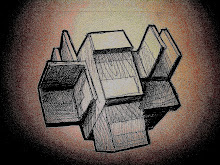In practice certain words, when they are abused by too common use, suffer in their meaning as if with cancer or inflation. Style is one of these. Its innumerable shades of meaning seem to span all experience. ....gasolines and toilet papers have style (while) annual fashions in clothes are purveyed as styles. In between lies familiar terrain of "historic" styles: cultures, nations, dynasties, reigns, regions, periods, crafts, persons, and objects all have styles. An unsystematic naming of binomial principles allows an illusion of classed order.
Thus, style is illusory, having semantic significance too specific for far too many of the subjects it defines. This is just one example, and he didn't even mention music. Currently (and well, for the past sixty or so years), popular music has been driven solely by its never ending conveyer belt of labels. To give a generic consortium of these is pretty easy: Rock and Roll, Blues, Folk, Rap, Dance, Oldies, 80s, World, Metal, Alternative... I could go on. Whether these labels are media or fan based is unimportant, as they are what specifically defines them as popular music. And this is what makes the entire thing so interesting. Popular music in this regard, much like Kubler's analysis of style, is itself completely ambiguous. It is an open label broadly defining too much within too narrow of parameters. Clearly, when considered as such, Rap and Metal are entirely different musical concepts, working within practically opposite spectrums. Last.fm, Pandora, and cable packages that offer 24 hour popular music stations are subjecting thousands of distinctly dynamic pieces of music into "appropriate" (and sometimes wholly inaccurate) subcategories for the purpose of practicality. This is not to say specific popularized genres were not being exploited as such in the countless record shops strewn about city blocks 30, 20, or even 10 years ago, but is rather offering the assumption that increased global communication and technology will inevitably lump these popularized identifiers as what may be deemed "popularly necessary". I mean look at "Soul/R&B" or "Electronica/Dance" or even just flat out "80s". The categorizations inevitably limit themselves.
Not only this, but the cyclical nature of Pop music is something driven entirely by "inventing" new labels. Much of this "inventing" has fallen victim to specific formulas. Within the structure of these formulas lies what I believe can appropriately be considered "easier" means of achieving success in the Pop music market. Are those Now Thats What I Call Music!!! compilations still being released? Interesting how easily those things actually garnered sales. Sure, the songs were catchy and at rare points, innovative. But what if we were to ask the NTWICM's sales team what they considered musical integrity? Any genre represented by a particular song or group on those compilations can probably be traced back to some of its predecessor's (primary influence) more popularized works, and so on. This is not to say any genre represented by a song or group was entirely disingenuous, as inspiration and idolization define music as an art form, but merely observe them in a highly processed, easily discernible formula.
This is one major reason why I've gotten so into Disco recently. It was particularly curious to me that such a hugely popularized genre, defined exclusively within pop culture knowledge by the 70s, leisure suits, mirror balls, glowing tiles, and the Bee Gees, could be so incredibly dynamic and varied. It was literally an entire culture I knew nothing about. With that, it was also some of the most personally satisfying music I've ever heard in my life. Interestingly, I'd never really known its subtleties and variations until after stumbling upon them, and sifting past its most righteously popular definers. The irony here is two-fold:
1. I knew it as a popularized label and consciously or sub-consciously avoided its chasms of audible goodies because of this.
2. I explored those chasms and now expressly identify my tastes through this popularized label.
Granted, I could hardly say I am qualified enough to declare myself anything other than an enthusiastic listener, but my intentions are good. Am I conforming to a label or not? Should positivity or negativity be invited into this recognition? Did this blog even make sense? Comments?



What about symphonic metal??
ReplyDeleteI agree with you that labeling can be problematic, however, we must remember that labeling the major genres of music has given us the opportunity to splice them together and tear them apart to get newer and cooler genres. The labeling of music is just like everything else in life and it is growing and it will continue to expand and contract forever and ever. Without the big labels we would not have such music labels as grindcore, indie, power rock, love ballads, Michael McDonald, symphonic metal, rockabilly, disco, trance, and so on... Now I am not saying that I support all of those smaller music genres and labels but they do exist and here is the problem...this creation of multiple mini labels and mini genres makes it so we can multicategorize our music and cross into more than one label, thus, creating the ultimate confusion in how we can define and separate music. Needless to say that music will always be what it is and no matter what it is awesome and incredibly necessary. After watching Iron Maidens Flight 666 dvd a few things about music were fully cleared up for me, and I would consider it an honor if you might like to watch that someday. Granted it is bias for me to want you to watch that but they truly define what it is to be rock 'n rollers and how a band should act. Their cult-like following is pretty amazing as well. Just remember that music is an art form and no matter what you do or think others will always feel different about it, therefore, it is subjective just as much as visual art is too.
I think my emotions got the best of me because of some of the anger ive seen against people living there lives. things like lookatthisfuckinhipster.com. I dont care about style critics anymore. I dont care if you fit some profile. like you said style is full of illusions and with help from marketing world it can loose tangability to its supposed creators anyways. as for disco it is an interesting movement in itself. It really alludes to a large volume music that you could dance to or maybe just have a lesurley time. you could argue that disco music started in with the first underground discoteques in france were people publicly listened to records together. I remember what a teacher told me about the strength in the volume of information out there and how enriching it could be. If you think about it the 70s produced a large volume of music. The first record digging culter thrived of 70s. Through all these years of making rhythmic danceble music you can find a labeless a purity in a sort of put up or shut up way. If the crowd wasnt feeling the track nobody danced. If the DJ didn't understand an essence of what could elate a crowd or evoke some response it would be apperent. How come pop culter has failed to remarket 70s disco culture. Disco is a chameleon and you can argue thats dance music never stopped being disco music. Its just DJ propelled music. peoples tastes changed some things went undergound people invented multitudes of mixing teqniques, new technology showed up. Music journalists and word of mouth may have been the why they stopped calling it disco but the essence of 70s influence remained. dance music culture is so vast and viral these days its pretty much become a point of pride when labels allude substantial meaning. Take fidget house for example. It was started as a joke name between producers that were messing with pitch bending alarmesque melodies lots of bass. Electro? really c'mon thats another running joke amongst music culture because label means almost nothing. You could call it distortion disco but thats no fun. we know that the manipulation of sonic a illusions for the sake of unifying in dancing or elation is the essence. If your at a club theres merrit to people who are dancing and having a good time as oppossed to salty people saying "OMG look at that such-in-such." im not going to bitch about haters anymore because obviously they dont like to dance or have fun the Disco way. if you don't understand Please listen to sexual earthquake over tokyos song "dance music" because you should be dancin yeah!!
ReplyDeletedamn, how long can you strut?
ReplyDelete